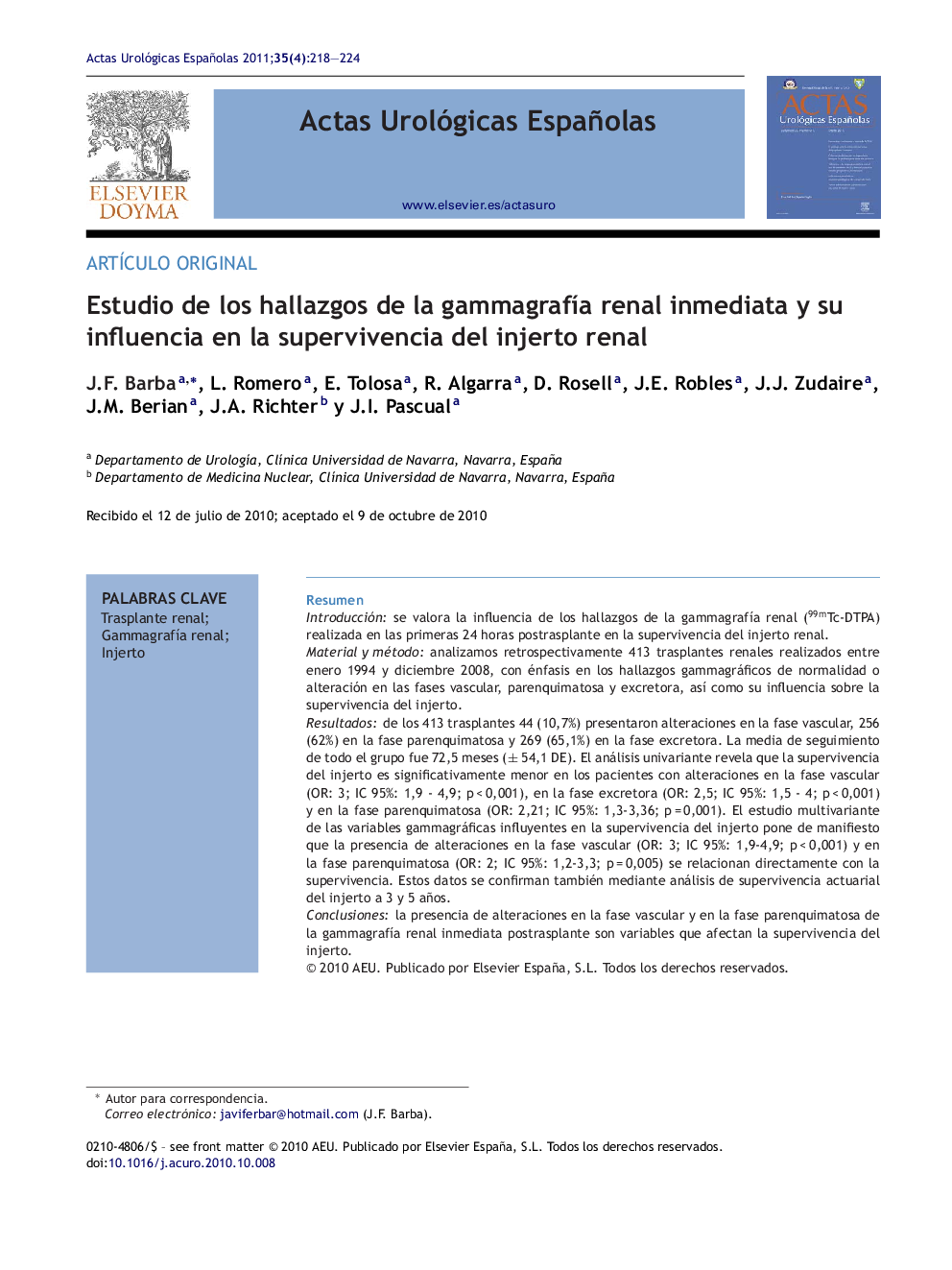| کد مقاله | کد نشریه | سال انتشار | مقاله انگلیسی | نسخه تمام متن |
|---|---|---|---|---|
| 3843819 | 1248126 | 2011 | 7 صفحه PDF | دانلود رایگان |

ResumenIntroducciónse valora la influencia de los hallazgos de la gammagrafía renal (99mTc-DTPA) realizada en las primeras 24 horas postrasplante en la supervivencia del injerto renal.Material y métodoanalizamos retrospectivamente 413 trasplantes renales realizados entre enero 1994 y diciembre 2008, con énfasis en los hallazgos gammagráficos de normalidad o alteración en las fases vascular, parenquimatosa y excretora, así como su influencia sobre la supervivencia del injerto.Resultadosde los 413 trasplantes 44 (10,7%) presentaron alteraciones en la fase vascular, 256 (62%) en la fase parenquimatosa y 269 (65,1%) en la fase excretora. La media de seguimiento de todo el grupo fue 72,5 meses (± 54,1 DE). El análisis univariante revela que la supervivencia del injerto es significativamente menor en los pacientes con alteraciones en la fase vascular (OR: 3; IC 95%: 1,9 - 4,9; p < 0,001), en la fase excretora (OR: 2,5; IC 95%: 1,5 - 4; p < 0,001) y en la fase parenquimatosa (OR: 2,21; IC 95%: 1,3-3,36; p = 0,001). El estudio multivariante de las variables gammagráficas influyentes en la supervivencia del injerto pone de manifiesto que la presencia de alteraciones en la fase vascular (OR: 3; IC 95%: 1,9-4,9; p < 0,001) y en la fase parenquimatosa (OR: 2; IC 95%: 1,2-3,3; p = 0,005) se relacionan directamente con la supervivencia. Estos datos se confirman también mediante análisis de supervivencia actuarial del injerto a 3 y 5 años.Conclusionesla presencia de alteraciones en la fase vascular y en la fase parenquimatosa de la gammagrafía renal inmediata postrasplante son variables que afectan la supervivencia del injerto.
IntroductionWe assessed the effect of the findings of the renal gammagraphy (99mTc-DTPA) taken in the first 24 hours after the transplant in the survival of the kidney transplant.Materials and methodWe retrospectively studied 413 kidney transplants carried out between January 1994 and December 2008, with emphasis on normal gammagraphic findings or alterations in the vascular, parenchymal and excretory stages, as well as their effect on the survival of the graft.ResultsOf the 413 transplants, 44 (10.7%) presented alterations in the vascular stage, 256 (62%) in the parenchymal stage and 269 (65.1%) in the excretory stage. The mean follow-up of the entire group was 72.5 months (± 54.1 DE). The univariate analysis shows that the survival of the graft is significantly less in patients with alterations in the vascular stage (OR: 3; IC 95% 1.9 – 4.9 p < 0.001), in the excretory stage (OR: 2.5; IC 95% 1.5 - 4; p = <0.001) in the parenchymal stage (OR: 2.21; IC 95% 1.3-3.36; p = 0.001). The multivariate studies of the gammagraphic variables that affect the survival of the graft show that the presence of alterations in the vascular stage (OR: 3; IC 95% 1.9-4.9; p < 0.001) in the parenchymal stage (OR: 2; IC 95% 1.2-3.3; p = 0.005) are directly related to survival. This data is also confirmed by means of the actuarial survival analysis of the graft at 3 and 5 years.ConclusionsThe presence of alterations in the vascular stage and in the parenchymal stage of the renal gammagraphy immediately after the transplant are variables that affect the survival of the graft.
Journal: Actas Urológicas Españolas - Volume 35, Issue 4, April 2011, Pages 218–224